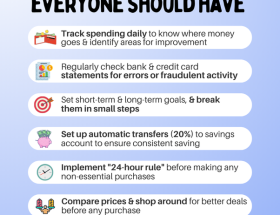Having an emergency fund is crucial for financial stability. It provides a safety net for unexpected expenses such as medical emergencies, car repairs, or job loss. Building an emergency fund is especially important for tech professionals who may face periods of uncertainty in the industry.
Set a Realistic Goal
The first step in building an emergency fund is to set a realistic savings goal. Experts recommend saving at least three to six months’ worth of expenses. Start by calculating your monthly expenses, including rent, utilities, groceries, and other necessities. Once you have a clear picture of your expenses, you can determine how much you need to save.
Create a Budget
To reach your savings goal, you’ll need to create a budget and track your expenses. Look for areas where you can cut back, such as dining out less frequently or canceling subscription services you don’t use. Allocate a portion of your salary each month to your emergency fund to ensure consistent savings.
Automate Your Savings
One of the easiest ways to build an emergency fund is to automate your savings. Set up a direct deposit from your paycheck into a separate savings account specifically designated for emergencies. By automating your savings, you can ensure that your fund grows steadily without the temptation to spend it.
Reduce Unnecessary Expenses
Eliminating unnecessary expenses can free up more money to contribute to your emergency fund. Consider cutting back on non-essential items like dining out, shopping for clothes, or expensive hobbies. Be mindful of your spending habits and prioritize building your emergency fund over non-essential purchases.
Side Hustle or Freelance Work
If your salary is limited, consider supplementing your income with a side hustle or freelance work. Utilize your tech skills to offer services such as web development, graphic design, or digital marketing. The extra income can help you reach your savings goal faster and build a robust emergency fund.
Review and Adjust Regularly
It’s important to review your budget and savings progress regularly. Keep track of your expenses and adjust your savings plan as needed. Life circumstances can change, so be flexible with your goals and make adjustments accordingly. Stay committed to building your emergency fund, even during challenging times.
Conclusion
Building an emergency fund is a smart financial decision that can provide peace of mind during unexpected situations. Regardless of your salary or income level, you can start saving for emergencies by setting realistic goals, creating a budget, automating your savings, and reducing unnecessary expenses. By following these steps and staying consistent, you can build a strong emergency fund to protect yourself in times of need.








